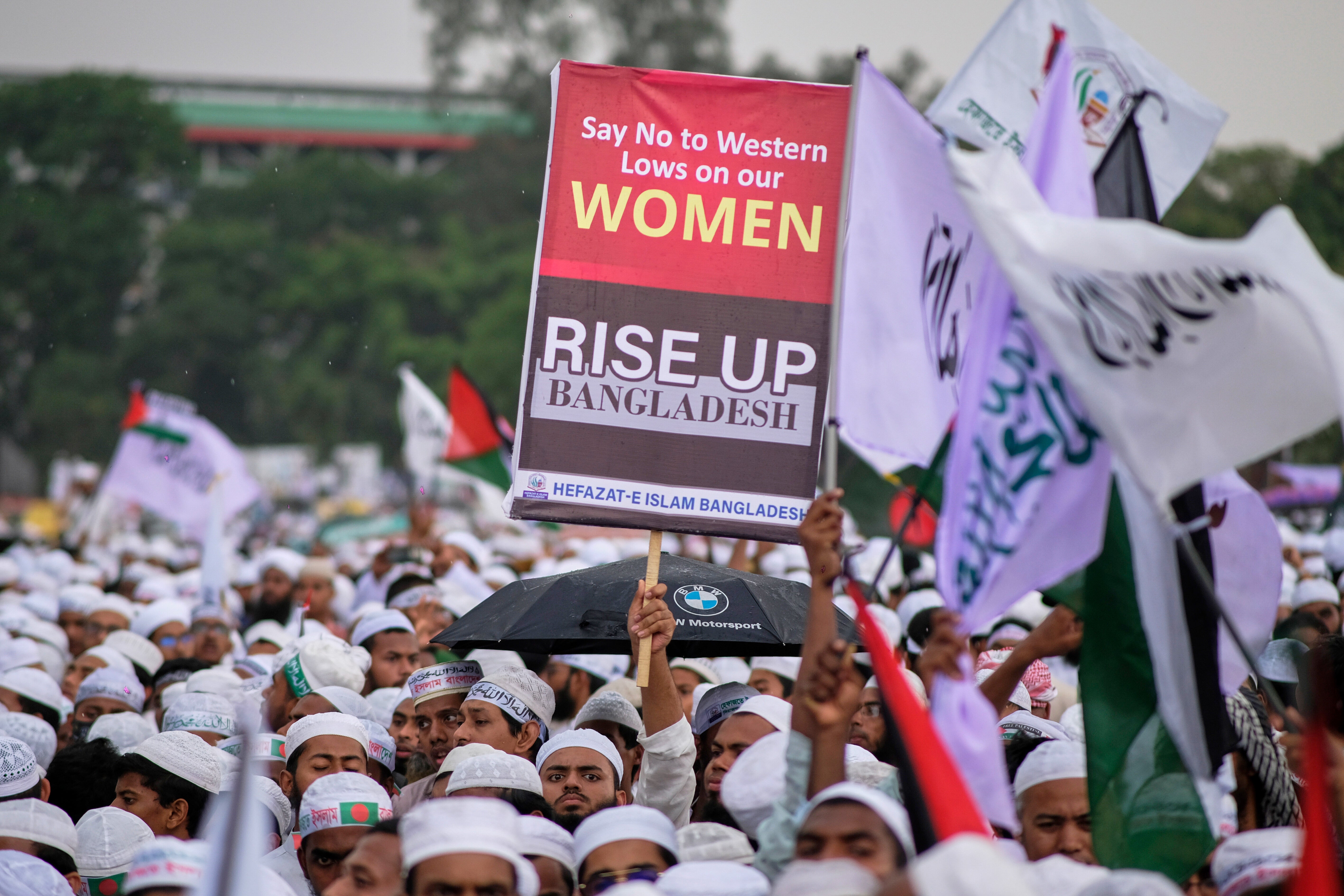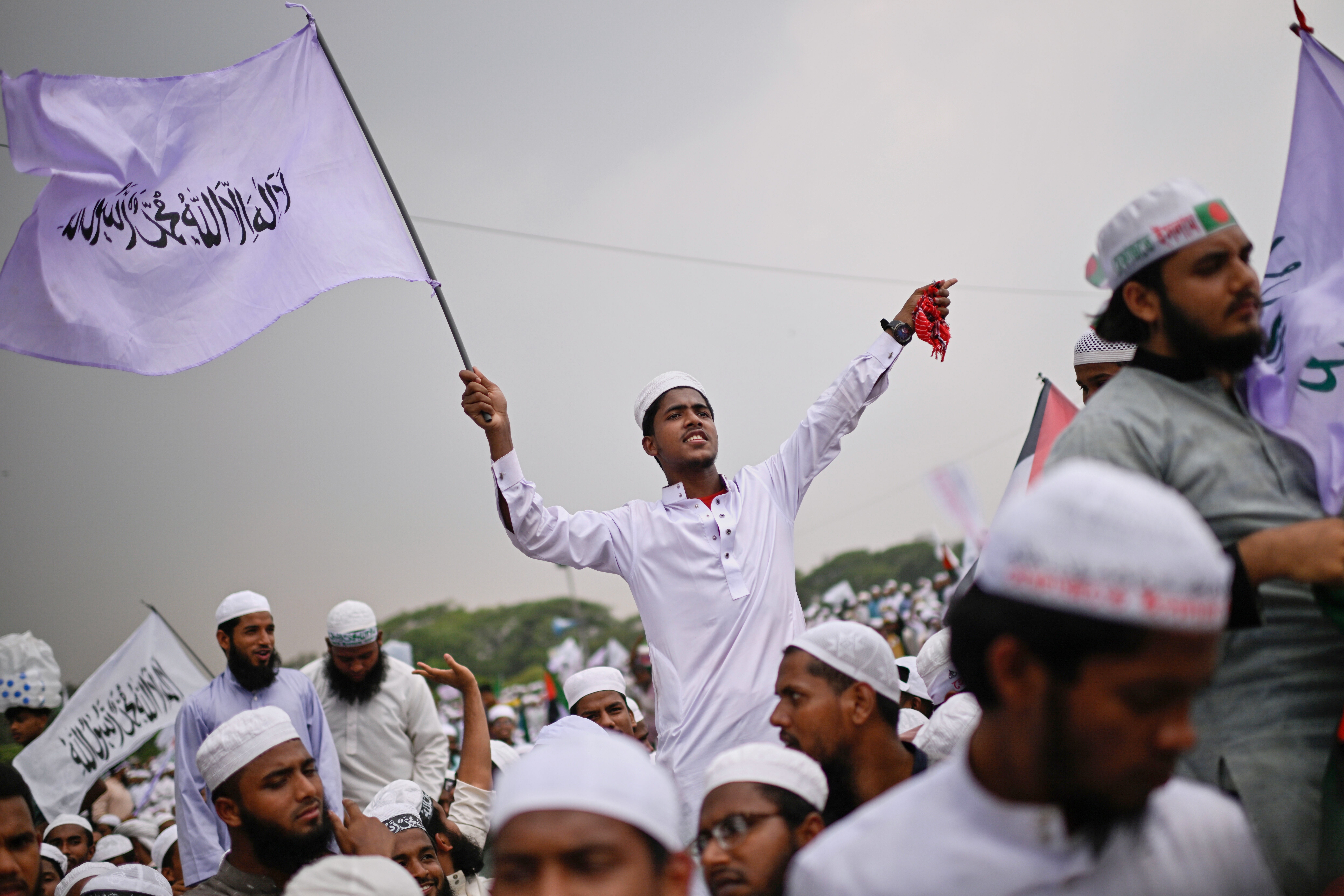ARTICLE AD BOX
Radical religious leaders in Bangladesh have once again pitted Islam against women amid growing concern over their rights in the embattled South Asian country.
Nearly 20,000 men gathered in Dhaka earlier in May to protest against the Women’s Affairs Reform Commission, installed by the interim government to ensure equal rights for women.
Mahfuzul Haque, leader of Hefazat-e-Islam, an Islamist group which had called the protest, urged the interim rulers to abandon what he called a "suicidal concept" of pluralism and asked to protect the religious practices of believers in the majority Muslim nation. Failing to do so, he threatened, would have severe consequences.
Mohammad Shihab Uddin, leader of a women's madrassa, or religious school, said "men and women can never be equal”.
The Quran, he told news agency AFP, outlined specific codes of life for both genders. "There is no way we can go beyond that.”
The commission, established last November under activist Shireen Parveen Haque, has given 433 recommendations for reducing, if not ending, gender-based discrimination in the country.
Key recommendations include giving women equal inheritance rights, increasing parliamentary seats for them, criminalising marital rape, and protecting the rights of sex workers.
The Islamist group has opposed the commission’s use of terms like "gender equality", "gender discrimination" and "third gender" while arguing that women's social progress should not be dictated by Western values. The employment of terms such as "inclusion" by the commission, the group has argued, could lead to a "destructive, anti-religious pro-homosexual society", the Daily Star reported.
The protesters threatened to reject any proposal they perceived to be anti-Islamic in a country with 92 per cent Muslim population.

The weekend rally comes amid a sharp rise in violence and discrimination against women as the fragile nation recovers from last year's mass protests that ousted prime minister Sheikh Hasina.
“We are worried about the increased visibility and the amount of space the right-wing has found after last year's protest,” Dr Maleka Banu, secretary general of the Bangladesh Mahila Parishad, the country’s largest women's organisation, said.
The Islamists were using their increased visibility since the agitation to create an environment of fear so that women were confined to their homes, Dr Banu told The Independent.
Last year, Bangladesh witnessed a student agitation snowball into a bloody revolution against Ms Hasina's Awami League government. It forced Ms Hasina to flee to India on a helicopter as an angry mob marched towards the presidential palace.
The power vacuum was quickly filled by a caretaker government under Hasina critic and Nobel laureate Muhammad Yunus, who returned to the country to be named interim leader.
"We are concerned about the lack of public condemnation from the political parties and the interim government," Dr Banu said. "Does the government think these rallies will play a part in changing public policy?"

Ms Hasina's government, autocratic and tainted with allegations of corruption and human rights abuses, was known to block Islamist movements.
The agitation that caused her ouster saw widespread participation of women armed with sticks and stones who clashed with the police.
"Women who took part in the anti-discrimination movement are realising that they are getting sidelined," Dr Banu said.
A 21-year-old Dhaka University student who spent weeks organising and demonstrating against Ms Hasina with male fellow students agreed with Dr Banu, calling for "anti-discrimination".
Now, she said, fear gripped her whenever she stepped out due to the shrinking space for women. “There are constant efforts to control women, and the Islamists are at the forefront of it,” the student, who asked not to be named for reasons of safety, told The Independent.
“It is a shame that the government has been notoriously silent so far and has allowed these radicals to make their voices heard and the lawlessness just adds to the crisis. Can you imagine such a revolution without the participation of women Bangladesh has resisted for long. They must not be allowed to thrive."

Ms Haque, chair of the women’s commission, earlier said women’s participation in the agitation was “unprecedented and so invigorating and so inspiring”.
“The disappointing part is that once it was all over, the women disappeared,” she told the American magazine Foreign Policy. “They were not to be seen in any serious decision-making.”
After Ms Hasina fled, law and order collapsed in Bangladesh as police refused to return to the streets, citing targeted violence.
Although the law enforcement apparatus limped back to work after some days, the situation remained grim, with reports of women being publicly humiliated because of their clothes, appearances and movements. It hasn’t gotten any better since.
"Women are being harassed in public spaces and hatred is being spread through social media. Our concern is that the state of lawlessness is making women panic," Dr Banu said.
“There is so much animosity toward women in this country that they are unable to freely access public space.”
The shift in stance was noted when a portrait of one of the first feminists in undivided India, Rokeya Sakhawat Hossain, was defaced with ink in December last year.
Social media videos purportedly showed conservatives exploiting the unstable law and order situation to morally police women over their choice of clothes.
In another incident, men were seen thrashing an effigy of what seemed to be a woman dressed in a saree resembling the ousted prime minister.
In March this year, at least 442 women and girls were subjected to various forms of violence, including rape, murder, and harassment, Mahila Parishad said.
In Bangladesh, women make up a substantial section of the labour force, which has been credited with lifting the economy out of a rut. Though their participation in the labour force increased to 42.7 per cent in 2022, it was largely confined to the unorganised sector, including the garments industry.
The sector employs about four million people, mostly women, and contributes over 10 per cent of the nation's GDP.
"Are those protesting prepared to deal with the collapse of the economy if women's participation is suddenly removed, given how much they are being pushed to the confinement of home,” said Dr Banu.
She said, historically, “whenever we tried to raise our voices with demands of equality, the right wing has pushed back”.
“In the past, we have seen the government rolling back the measures swiftly after the protests in fear of losing votes. No government has taken concrete steps. They always bow down in front of the right-wing and forget women's rights," she complained.
At least 67 rights groups have jointly condemned the derogatory remarks made by the Islamist group as well as the acts of aggression surrounding the recommendations of the Women's Affairs Reform Commission.
The National Citizens’ Party, formed by members of the student-led agitation following Ms Hasina's ouster, said it "deeply understands women's freedom, right to expression, their struggle in society".
"We believe it is necessary to keep the door open for constructive discussions with all representative stakeholders on the issues where disagreements have arisen," it said, according to Bangladesh Sangbad Sangstha.
Hefazat-e-Islam has threatened to hold mass rallies on 23 May if its demands are not fulfilled by the Yunus administration.
The Independent has reached out to the interim leader’s office for comment.









 English (US) ·
English (US) ·